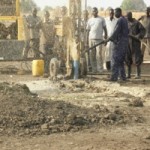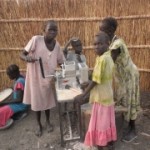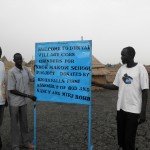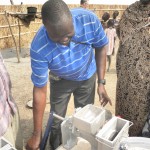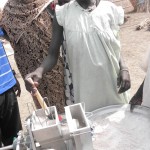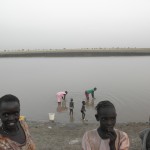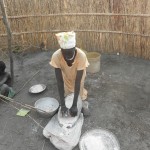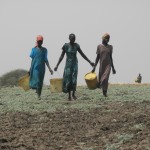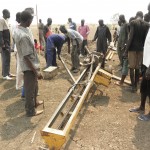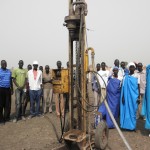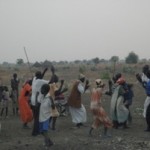Project Pillars
The Khor Wakow School Project is a nonprofit organization, dedicated to providing basic education service in the Khor Wakow villages along the Khor Wakow River in Southern Sudan.
It is estimated that over 99% of Khor Wakow’s 6000 inhabitants are illiterate. Two decades of unrest and civil war have destroyed 2.5 million lives, village life, and schools. The number of displaced people who are returning to the Khor Wakow area is on the rise and many of the returnees, both children and adults, have not received any education. Education is a fundamental factor in helping children and people affected by war to rebuild their lives. The purpose of the Khor Wakow School Project is to construct a school and supporting infrastructure in the Dunyal village within the Khor Wakow area.
It is estimated that over 99% of Khor Wakow’s 6000 inhabitants are illiterate. Two decades of unrest and civil war have destroyed 2.5 million lives, village life, and schools. The number of displaced people who are returning to the Khor Wakow area is on the rise and many of the returnees, both children and adults, have not received any education. Education is a fundamental factor in helping children and people affected by war to rebuild their lives. The purpose of the Khor Wakow School Project is to construct a school and supporting infrastructure in the Dunyal village within the Khor Wakow area.
1. Christ-Centered Education
There is no school at this time. Classes are taught under trees by 35 teachers on a voluntary basis. Classes are often canceled for several months during the long rainy season. A school building will provide protection, encourage attendance, and allow educational opportunities year round.
The school will offer primary education to children and adults of the Khor Wakow villages. The land for the construction site was donated by Khor Wakow chiefs and elders when David Jal and Carole Cochran visited the village in July 2010. The project will serve 400 children between ages 5 to 17. 8-10 classrooms are needed for the school.
Educating Girls
From the book Half the Sky authors, Nicholas Kristof and Sheryl Wudunn write, “ Yet another reason to educate and empower women is that greater female involvement in the society and the economy appears to undermine extremism and terrorism.” The authors contend that the key to global stability and economic prosperity lies in unleashing the potential of women and girls. The authors continue to say, “The world is awakening to a powerful truth: Women and girls aren’t the problem: They’re the solution.”
From www.girleffect.org the argument for educating 600 million girls in the developing world as a prescription for changing the world is as follows:
“The Girl Effect” proclaims: Change, peace, prosperity, stability, global health, conservation, and the end of AIDS starts with girls.
There is no school at this time. Classes are taught under trees by 35 teachers on a voluntary basis. Classes are often canceled for several months during the long rainy season. A school building will provide protection, encourage attendance, and allow educational opportunities year round.
The school will offer primary education to children and adults of the Khor Wakow villages. The land for the construction site was donated by Khor Wakow chiefs and elders when David Jal and Carole Cochran visited the village in July 2010. The project will serve 400 children between ages 5 to 17. 8-10 classrooms are needed for the school.
- Estimated Cost: $ 200,000
Educating Girls
From the book Half the Sky authors, Nicholas Kristof and Sheryl Wudunn write, “ Yet another reason to educate and empower women is that greater female involvement in the society and the economy appears to undermine extremism and terrorism.” The authors contend that the key to global stability and economic prosperity lies in unleashing the potential of women and girls. The authors continue to say, “The world is awakening to a powerful truth: Women and girls aren’t the problem: They’re the solution.”
From www.girleffect.org the argument for educating 600 million girls in the developing world as a prescription for changing the world is as follows:
- “Girls + poverty + no education = husband, babies, hunger, HIV.”
- “Girls + Education = loans, business, community development, and gender equality.”
- When a girl in the developing world receives seven or more years of education, she marries four years later and has 2.2 fewer children and has healthier babies and is more likely to educate her children.
- When girls and women earn income, they reinvest 90 percent of it into their families, as compared to men who invest 30-40 percent.
- An extra year of primary school boosts girls’ future wages by 10 to 20 percent.
- An extra year of secondary school boosts girls’ future wages by 15 to 25 percent.
“The Girl Effect” proclaims: Change, peace, prosperity, stability, global health, conservation, and the end of AIDS starts with girls.
2. Health and Humanitarian Support
Water wells provide a source of safe and clean water for children at school, and for the entire community in the Khor Wakow area. Collecting water is time-consuming and often keeps children, especially girls, from attending school. The water is collected from rivers and tributaries and is often contaminated and causes severe diseases. Frequently, drinking water is simply collected from the Khor Wakow River.
The Khor Wakow School Project drilled the first-ever water well in the village area in February of 2012.
Corn Grinding Mills
An automated corn grinding mill relieves girls from hand grinding corn every day and would allow them to attend school. Presently, less than one percent of girls in South Sudan complete primary education according to study done by UNICEF.
Khor Wakow supporters raised enough funds to deliver five manual corn grinders to the village in February of 2012.
Water wells provide a source of safe and clean water for children at school, and for the entire community in the Khor Wakow area. Collecting water is time-consuming and often keeps children, especially girls, from attending school. The water is collected from rivers and tributaries and is often contaminated and causes severe diseases. Frequently, drinking water is simply collected from the Khor Wakow River.
The Khor Wakow School Project drilled the first-ever water well in the village area in February of 2012.
Corn Grinding Mills
An automated corn grinding mill relieves girls from hand grinding corn every day and would allow them to attend school. Presently, less than one percent of girls in South Sudan complete primary education according to study done by UNICEF.
Khor Wakow supporters raised enough funds to deliver five manual corn grinders to the village in February of 2012.
3. Community Development
4. Agricultural Improvement
Back to: School
